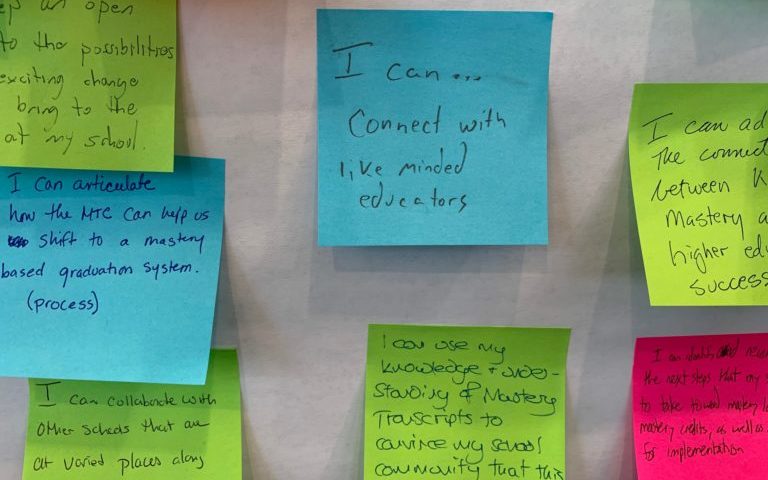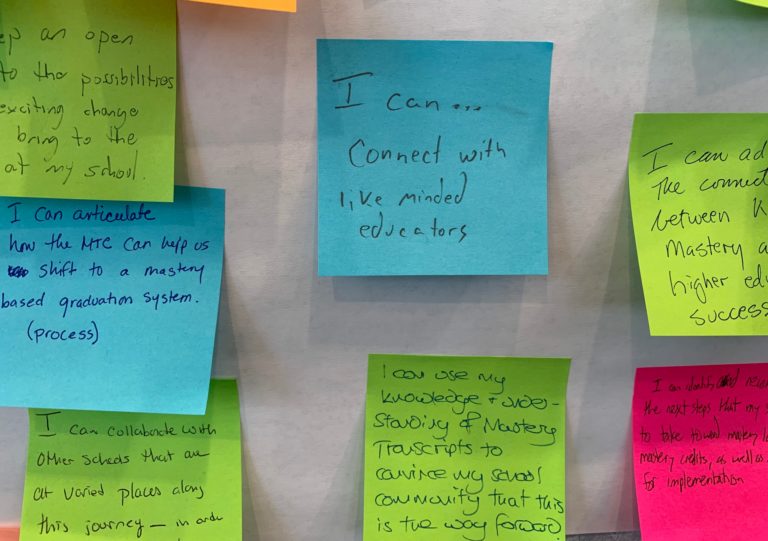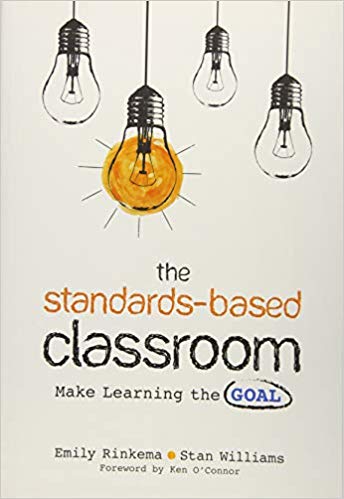Already a member? Log in to the Member Site at members.mastery.org.

The Mastery Transcript: Game Changer
May 17, 2019
Reinventing High School: Measuring What Matters Most
June 23, 2019Letter to the Editor: Feedback for MTC


Site Directors capture the benefits of an MTC meeting: professional learning, connecting with colleagues on similar journeys, engaging in transcript codesign
by Emily Rinkema and Stan Williams, proficiency-based learning coordinators at Champlain Valley School District and coauthors of “The Standards-Based Classroom: Make Learning the Goal“
Dear MTC:
Thank you so much for such an inspiring two days. We wanted to reach out to share our thanks and some of our thoughts. We have attended so many workshops, institutes, and conferences over the past decade that we’ve been involved in the move to standards-based learning, and the past few days in Boston provided some of the best conversations and sparked some important thinking for us. We arrived excited about the possibilities that MTC offers, and left not only encouraged, but inspired by the collective potential of the thinkers and educators in the room.
The move from conventional teaching & learning to standards-based teaching & learning has been the focus of our professional lives for the past 10 years. We worked in our own classrooms initially, and as we developed and tested strategies and systems, began to guide the work of the other teachers in our school. The high school has now been standards-based for five years, and our district middle schools for three. We continue to to improve our implementation each year, but we’re confident that learning and engagement is improving for all students. We have graduation standards, common course learning targets and scales, and increasingly more effective instruction and assessment. As teachers have shifted to a learning mindset rather than a teaching mindset, they have started to push the boundaries of our old systems and structures, leading to internally driven changes in schedules, classroom environments, and a significant increase in student-driven learning and flexible pathways. Our district is in a place where we are now organically searching for a better way to communicate learning–teachers, parents, and students are recognizing the limitations of our current transcript and are starting to look for other options. It’s kind of a great place to be.
Part of our job is to support the ongoing implementation of SBL in the classrooms around our district, but another part of our job (and one that we both love) is to work with our district leaders to push the boundaries of our thinking about learning and school. We are lucky enough to be able to spend time reading, attending conferences like the MTC, talking with experts, and imagining what school could (and should) be. This is one of the reasons we are so excited about the work you are doing.
In all of our thinking and learning about the future of school, one thing is clear. We need to have a solid foundation. We have watched schools all over the country fail at the transition because they focused on changing the end game–what and how we communicate–but did not take the time to ensure the difficult and significant changes in instruction and assessment that this transformation requires. Susie, you spoke to this in your opening, as did Chris Sturgis in her keynote; moving to a standards-based system challenges many of the fundamental beliefs about learning that we have held throughout our careers, and shifting practices is not easy.
Our approach to standards-based learning was developed through years of trial and error. We are lucky enough to work in a district with an incredibly supportive community–but even so, it was not easy. We kept a blog about our transition, and here’s a post we wrote about how hard (but worthwhile) the journey is: This SBL Think is Freakin’ Hard. We truly believe we have passed the tipping point, but for a while we weren’t sure we were going to make it. Our implementation is still inconsistent, and we are working to improve practices and tweak systems, while continuing to look at what comes next.
We had so many conversations over the past few days with schools looking to start their journey to mastery learning, and it became clear quickly that many of these schools are most worried about and focused on the end game–changing how they grade and how they communicate about students–without understanding the enormity of the changes required under that iceberg tip. You spoke about the MTC being catalytic, that changing how we communicate has the potential to change everything else. We agree. But we also became worried that without deep understanding of the significance of the underlying pedagogical changes, schools embarking on this journey may not be able to survive the shift. Selfishly, that’s scary. We believe so strongly in the transformative power of SBL, yet the majority of schools and districts (and states) that set out to change return to conventional practices within a few years.
We know you know all of this. One of the things that gave us hope was to see that those of you leading MTC are so clearly basing your work on brain and educational research–that you are not about creating a fancy transcript, but rather, you’re about the moonshot of transforming learning. We know you are working with experts in all areas, but if you ever feel our experience and approach could be effective, we would love to help.

We have a book that provides a practical approach to shifting instruction and assessment–and we’ve worked with faculties to create the tools, strategies, and systems that allow for substantive change in the classrooms. It’s important to us that schools experience success, because a few schools changing is not educational transformation–it will take lots of schools leading the way in order to effect the kind of change that will help all students.
Thanks for the work you are doing, and again, thanks for a great few days in Boston!




